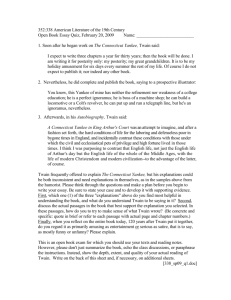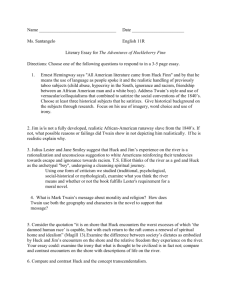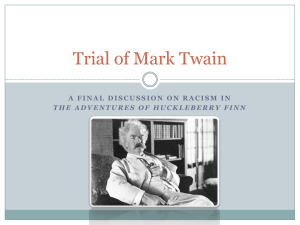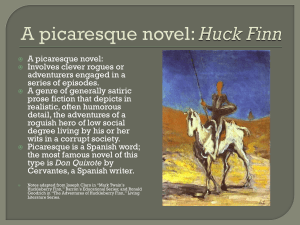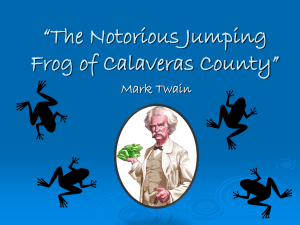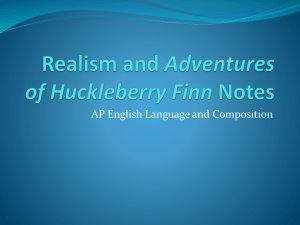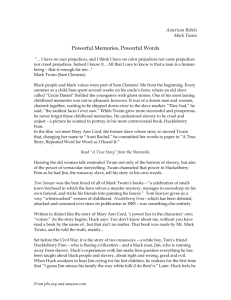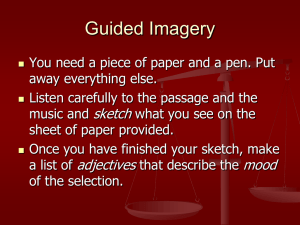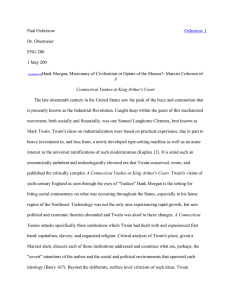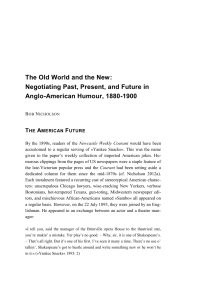Author:
advertisement
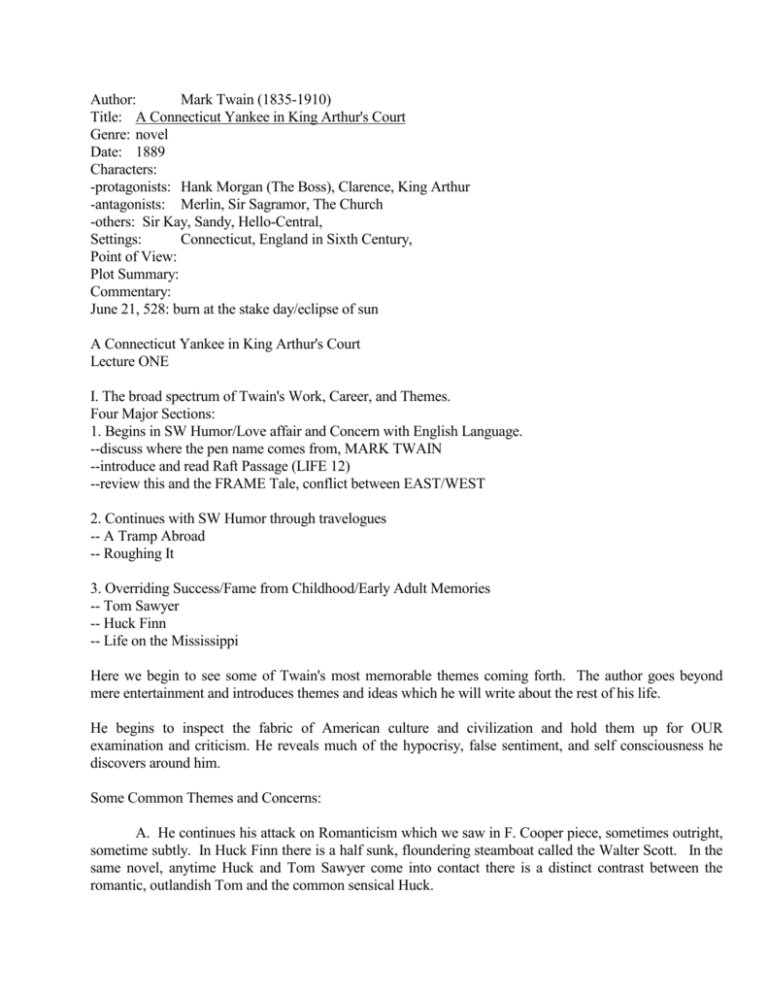
Author: Mark Twain (1835-1910) Title: A Connecticut Yankee in King Arthur's Court Genre: novel Date: 1889 Characters: -protagonists: Hank Morgan (The Boss), Clarence, King Arthur -antagonists: Merlin, Sir Sagramor, The Church -others: Sir Kay, Sandy, Hello-Central, Settings: Connecticut, England in Sixth Century, Point of View: Plot Summary: Commentary: June 21, 528: burn at the stake day/eclipse of sun A Connecticut Yankee in King Arthur's Court Lecture ONE I. The broad spectrum of Twain's Work, Career, and Themes. Four Major Sections: 1. Begins in SW Humor/Love affair and Concern with English Language. --discuss where the pen name comes from, MARK TWAIN --introduce and read Raft Passage (LIFE 12) --review this and the FRAME Tale, conflict between EAST/WEST 2. Continues with SW Humor through travelogues -- A Tramp Abroad -- Roughing It 3. Overriding Success/Fame from Childhood/Early Adult Memories -- Tom Sawyer -- Huck Finn -- Life on the Mississippi Here we begin to see some of Twain's most memorable themes coming forth. The author goes beyond mere entertainment and introduces themes and ideas which he will write about the rest of his life. He begins to inspect the fabric of American culture and civilization and hold them up for OUR examination and criticism. He reveals much of the hypocrisy, false sentiment, and self consciousness he discovers around him. Some Common Themes and Concerns: A. He continues his attack on Romanticism which we saw in F. Cooper piece, sometimes outright, sometime subtly. In Huck Finn there is a half sunk, floundering steamboat called the Walter Scott. In the same novel, anytime Huck and Tom Sawyer come into contact there is a distinct contrast between the romantic, outlandish Tom and the common sensical Huck. B. He questions frontier Puritanism/Established Church through the guise of Huck Finn (READ HUCK 12-13). "Its not how close to Hell you are, its the direction you're facing" C. He examines the horrid institution of slavery in all of its ugly dimensions in Huck Finn. -- brief discussion of banned books, term "nigger", -- the moral climax of Huck, all right then, I'll go to hell. (Huck overcoming the TRAINING of his culture) D. along these lines, attacks Aristocratic sentiment which is prevalent in the South before the Civil War. Blames Walter Scott for the Civil War. Scott's romances of glory of feudalism, equated with Southern Aristocracy of the Genteel plantation owners. E. Examines the Art and Deception of the Con Man in American culture (Melville does a great job in THE CONFIDENCE MAN), through the King and the Duke. Intro Camp Meeting scene...(READ HUCK 133) F. He examines the danger and ugliness of the MOB impulse, how people will "go along" with about anything, jump on the bandwagon, get up a lynch mob, etc. G. Examination of Appearances vs. Reality. Mississippi as Symbol of its beauty and its underlying dangers. How experience takes away from innocence. (READ SHORTER WRITINGS, 92-92) 4. JUMP to the last phase of Twain's life and works, which take on a much darker, ominous tone. -- loses faith in human race and its institutions -- doubts existence of a God that is even aware of mankind -- hopelessness of improving man or his culture -- sees universe operating in terms of mechanical determinism -- sees death/obliteration as man's only escape from the dreamworld he finds himself in (READ Letter 7, LETTERS FROM THE EARTH) What lies right in the middle of Twain's Middle Period and His Later Period is Connecticut Yankee with many elements of ALL of Twain's themes and ideas present. Genetic Criticism: Life, Times and Influences technically: genetic criticism concentrates upon, but is not limited to, the observable changes in the texts between the earliest available draft and the final, usually printed, form. The primary subject matter includes, if available, jottings and notes, exploratory or discovery drafts, manuscripts, cancellations, insertions, revisions, rearrangements, copy sheets, proof sheets, gallery revisions and the final text. (Doyno 10) In some cases genetic criticism can reveal an author's original intentions or the meanings an author staked out in the early plans. But often the writer discovers, creates, and connects while writing. In many cases genetic criticism can increase our knowledge of how the author's mind was working while creating art and, perhaps, artistic ambiguity.(Doyno 10-11) Genesis of CONNECTICUT YANKEE beginnings: 1880, Twain reads THE BOY'S KING ARTHUR fall, 1884, Geo Cable gives Twain copy of Mallory Dec., 84, famous first notebook entry, armor scene in 1885, "Private History of Campaign that Failed" describes both the farcical and serious, extended tall tale -- he will repeat this in YANKEE 1. Jan-Feb, 1886 [Word of Explanation, Chapters 1,2,3] modern civilization almost all ways superior to ancient people depicted as "children" or child-like Merlin a mere bumbler Nov. 1886: speech on story plans, defend Arthur w Gat. guns take 40% of income Yankee as Amoral Opportunist 2. Summer, 1887 [Chapters 4 - 20, excluding 10] ridding Arthur's kingdom of political/social injustice '86-'87, from Republican Party (Lincoln/Grant) to Mugwump Party supports Grover Cleveland speaks out for civil rights against political dictatorships for rise of unions as means of equalizing power turns into an Anglophobe a. in England, gentry are beating Liberal Party b. M. Arnold's review of Grant's Memoirs (shall/will) c. May, 87: reads Standring's PEOPLE'S HISTORY OF ENGLISH ARISTOCRACY, laws of primogeniture, fetish of nobility -- satirize English laws and practices -- knights/ladies more course/ignorant/superstitious -- Merlin more evil, spreads false rumors -- Ch 8: attacks laws/customs that protect royalty/nobility/Church -- from Hank the Entrepreneur to Hank the Reformer patent office, factories, schools, telephones, etc. -- loyalty to country, not institutions (defends leave Rep. Party 3. Summer, 1888 [21-36, 10] and Fall/Spring of 1889 [37-44] summer at Quarry Farm fall/spring in Hartford, Conn. illness in family, wife's eye troubles/cannot read & edit text business problems Charles L. Webster publishing company Twain keeps pulling money out of company to pay for Paige Typesetting Machine (technology) M. Arnold article: Americans are irreverent due to the American Press and the "American addiction to the funny man" Chs. 27-38: King/Yankee experience tyranny, the poor/slavery Chs. 39-44: attempt to destroy knight errantry destroy English aristocracy, set up a Republic Critical Observations of Yankee: most satirical and most gloomy of works to date constant problems with point of view, Twain's voice intrudes Hank Morgan never becomes a full character, just a device purpose of the book too diverse, Twain tries to do too much Contradictions even in Hank stranger in strange land........a know it all equalitarian....................a boss, manager great technician................uses for trivial effects humanitarian....................monster who kills 25,000 knights constantly alternates/juxtaposes the comic and serious example: horror of Morgan LeFay, but he kills musicians often, emotional excess: hanging of starving mother Anti-Utopian Novel Hank tries to set up Utopia, fails sweeping reforms in human society are impossible technology provides only means for massive destruction technology desensitizes the individual to suffering of others hopelessness, universe as mechanical determinism Training is Everything For next time: I talked this time, you talk next time. Find cases, examples of the Twain themes/ideas/concepts discussed. including: Southwestern Humor Love Affair with Language Attack on Romanticism Attack on Religion/Church Attack on Slavery Attack on Aristocratic Sentiment Discussion of Con Man Attack on Mob Impulse Discussion of Appearances vs Reality Benefits/deficits of technology for society Dark Mechanical determinism 1. Find examples of these in text 2. Also bring a little contemporary relevance to them. What might Twain be teaching us that we can apply to what is going on in our world today??? YANKEE, LECTURE TWO--quotes all from Signet Classic Paperback 1. Southwestern Humor 22, 25 (sexual), 30, 32, 74, 80, 98, 105-107(LeFay), 129-30 (Hogs), 289, 296 -- mention famous print: the PEN IS mighter than the sword 2. Love Affair with Language 96, 151 (German) 3. Attack on Romanticism 68, compare to Cooper attack 4. Attack on Religion/Church 53, 55, 64, 82, 113, 145 5. Attack on Slavery 54, 115, 139-141, 171-172, 211, 216 (Civil War), 251-2, 285 6. Attack on Aristocratic Sentiment 54, 96, 81, 134, 174, 218, 219, 228 (just destroy them in end) 7. Discussion of Con Man 155-56, Merlin, 168 (Rival) HANK HIMSELF, miracles and showmanship (255) 8. Attack on Mob Impulse 213, 219, 244, 247, 256 9. Discussion of Appearances vs Reality magic of science, everything done for showmanship (like Tom Sawyer) 10. Benefits/deficits of technology for society 59 (three firsts), 100 (pollution), 149, 152, 166, 199, 299, 301 (like nuclear button) & 309 11. Dark Mechanical determinism 206 -- better to be dead TRAINING is all: 109, 114, 119 horrendous ending of novel ---------------------------------------------------------------original idea worked in: 76 notice the book begins with eclipse, Ch 6, ends with 239 blotting Sagramore connection: 12, 62, 277 (Ch 39) foreshadowing: 40, 119, 135, 237 Franklin references: 23-24, 50, 52, 229 discussion of wages: 220, 231, 234 NRA: 195 ***Missionary Concept, Sandwich Islands, Twain's Campaign Against: Hank as Missionary? 47, 99, 283, 284, 318 ***Biography; Money matters and the Paige Typesetter: 15, 48, 87 (spendthrift), 171, 224-225, 268 (mistakes), 272 (impotence) 276 (laugh at him), 281, 305, 320
